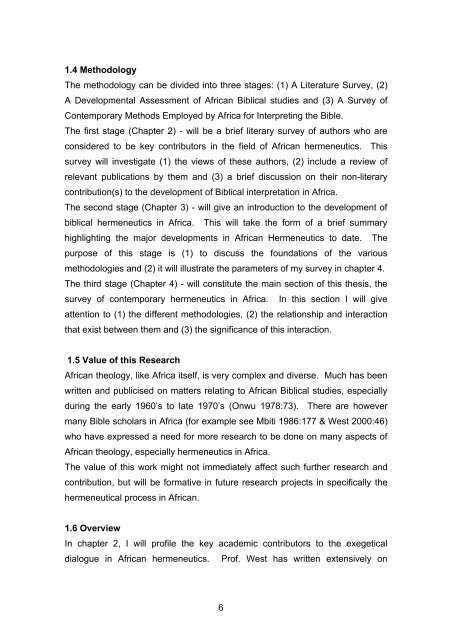African Hermeneutics: The Current State - Theology In Africa
African Hermeneutics: The Current State - Theology In Africa
African Hermeneutics: The Current State - Theology In Africa
You also want an ePaper? Increase the reach of your titles
YUMPU automatically turns print PDFs into web optimized ePapers that Google loves.
1.4 Methodology<br />
<strong>The</strong> methodology can be divided into three stages: (1) A Literature Survey, (2)<br />
A Developmental Assessment of <strong><strong>Africa</strong>n</strong> Biblical studies and (3) A Survey of<br />
Contemporary Methods Employed by <strong>Africa</strong> for <strong>In</strong>terpreting the Bible.<br />
<strong>The</strong> first stage (Chapter 2) - will be a brief literary survey of authors who are<br />
considered to be key contributors in the field of <strong><strong>Africa</strong>n</strong> hermeneutics. This<br />
survey will investigate (1) the views of these authors, (2) include a review of<br />
relevant publications by them and (3) a brief discussion on their non-literary<br />
contribution(s) to the development of Biblical interpretation in <strong>Africa</strong>.<br />
<strong>The</strong> second stage (Chapter 3) - will give an introduction to the development of<br />
biblical hermeneutics in <strong>Africa</strong>. This will take the form of a brief summary<br />
highlighting the major developments in <strong><strong>Africa</strong>n</strong> <strong>Hermeneutics</strong> to date. <strong>The</strong><br />
purpose of this stage is (1) to discuss the foundations of the various<br />
methodologies and (2) it will illustrate the parameters of my survey in chapter 4.<br />
<strong>The</strong> third stage (Chapter 4) - will constitute the main section of this thesis, the<br />
survey of contemporary hermeneutics in <strong>Africa</strong>. <strong>In</strong> this section I will give<br />
attention to (1) the different methodologies, (2) the relationship and interaction<br />
that exist between them and (3) the significance of this interaction.<br />
1.5 Value of this Research<br />
<strong><strong>Africa</strong>n</strong> theology, like <strong>Africa</strong> itself, is very complex and diverse. Much has been<br />
written and publicised on matters relating to <strong><strong>Africa</strong>n</strong> Biblical studies, especially<br />
during the early 1960’s to late 1970’s (Onwu 1978:73). <strong>The</strong>re are however<br />
many Bible scholars in <strong>Africa</strong> (for example see Mbiti 1986:177 & West 2000:46)<br />
who have expressed a need for more research to be done on many aspects of<br />
<strong><strong>Africa</strong>n</strong> theology, especially hermeneutics in <strong>Africa</strong>.<br />
<strong>The</strong> value of this work might not immediately affect such further research and<br />
contribution, but will be formative in future research projects in specifically the<br />
hermeneutical process in <strong><strong>Africa</strong>n</strong>.<br />
1.6 Overview<br />
<strong>In</strong> chapter 2, I will profile the key academic contributors to the exegetical<br />
dialogue in <strong><strong>Africa</strong>n</strong> hermeneutics. Prof. West has written extensively on<br />
66


